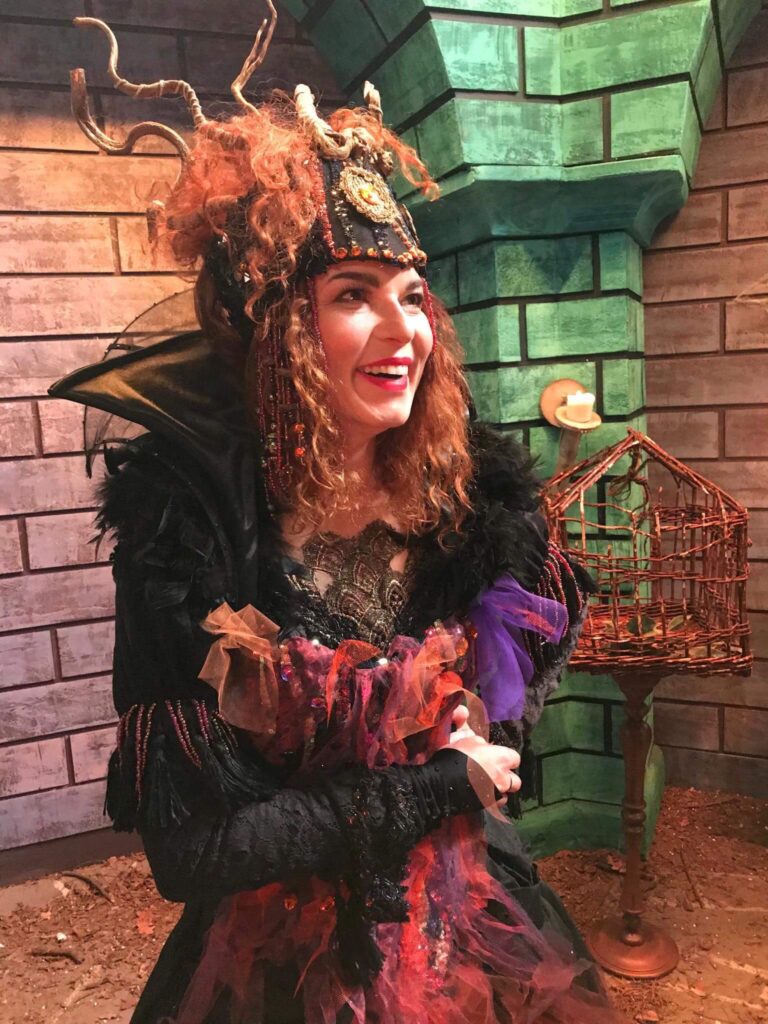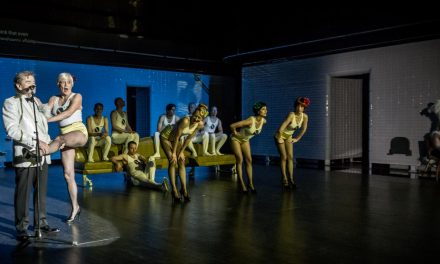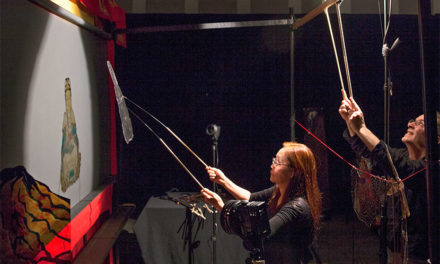For part II of this essay, click here.
The coronavirus pandemic is laying bare the ills gnawing at Polish theatres, such as starvation rates, precarious freelance work, people working without contracts, and the inability of some theatre professionals to afford medical insurance and social security. Plus, there’s the prospect of the professional hiatus lasting until September.
Since March 11, 2020, everyone in the cultural sector has been affected, be it freelancers, full-time staff or directors of arts organizations. On the fateful day when all arts venues in Poland were ordered to close, everyone at Wrocław’s Capitol Music Theater realized that the 2020 Festival of Actor Songs (PPA in Polish) would have to be canceled for the second time in history, the first being a two-year hiatus during martial law in 1981‒82. Konrad Imiela, head of Capitol and of the Festival, was in a fighting mood until Wednesday morning but had to give up after the Prime Minister gave his speech at a press conference on Wednesday.
Imiela was loath to do so, knowing that the cancellation will hit audiences, participants of the Song Interpretation Contest, the lineup of artists, and finally ‒ Capitol itself, also because the Festival will cost a lot of money despite cancellation. The event has a budget of 3,100,000 PLN (1 PLN is c. 0,25 USD or 0,22 EUR), of which 540,000 PLN has already been spent: productions are in development, some sets have been built, an advertising campaign has been launched, airline tickets ordered, venue hire costs have been partially paid. ‘We will try to recoup some of these sums,’ says Hubert Zasina, Capitol’s Finance Director.
We don’t know how much will be recovered as calculations and negotiations are still in progress.
‘We are writing letters to our contractors, terminating contracts.’ says Imiela. ‘The pandemic is a force majeure, the cause of cancelling is independent of us. We will be relieved of some of our obligations, but we have a problem with the productions that have been in the pipeline for months. And there is also something you can’t put a price on ‒ the cancellation hurts, because we were all looking forward to the festival.’
Maybe the event can be saved by moving it to the second half of the year and whittling it down to the Song Interpretation Contest and the OFF Stream ‒ there has been talk of doing this, but it all depends on how things pan out.
‘I understand the government’s decision, because swift action was needed to contain the spread of the virus, to flatten out the wave,’ says Imiela. ‘But I also understand the plight of the artists who had blocked off dates to do work for us and now we can’t pay them for the work they were prevented from doing. We are aware that many of them operate in free market conditions and have no fixed salary. That’s why, I believe, a ministerial fund should be created for artists with no regular paid employment, compensating for the money lost due to the government’s blanket cancellation of all theatre shows and concerts. They are in a desperate position now. The actor of a theatre closed for the duration of the pandemic who does not perform on stage will earn 50 to 60 percent less than usual, but will be able to survive. The fund should also be in place in the organizer’s office, in the city hall or the marshal’s office, to reimburse at least part of the losses in this bleak situation. The City of Wrocław is aware of the problem, we are currently in talks with the officials.’
Jerzy Pietraszek, head of the Culture Department of the Wrocław City Office, chimes in: ‘We are gathering information about the situation of people employed and collaborating with the city’s arts venues. We’re developing a plan to compensate for losses resulting from putting programming on hold, aimed at both salaried actors and artists working with theatres on gig contracts, such as actors, musicians, and dancers.’
Anna Skubik: Nothing to Fall Back On
The problem is that such assistance will not cover a wide range of people who make a living as freelance artists, deliver workshops or make occasional appearances in TV series. In the space of a few hours, actress Anna Skubik lost hope for any employment or income in the nearest future. Together with Arkadiusz Cyran of Ad Spectatores Theater, she was due to play in the show Open Relationship. Trips were planned to Warsaw to the set of the popular science series Al-Chemist and to the Astana Theater Festival, Tajikistan.
‘Everything has been cancelled, including the talks and meetings to discuss further plans,’ she says. ‘I have nothing, and there’s little hope I’ll be able to make any money in the near future.’ This ‘nothing’ is all the more bitter as Skubik has no medicover or social security. ‘I work on gig contracts, and my fees are so small that I just can’t afford voluntary health insurance, which costs almost 500 PLN a month these days. Most artists I know are in a similar position. Not long ago, I had a greater sense of security ‒ I worked part-time in a corporation to have the right to medical care and a secure income. But it turned out to be incompatible with my acting in the long run, especially before show openings and when I appeared in TV series. After finishing work in the office, I would get on a train to the capital, I’d come back home at dawn and then back to work. In the end, things came to a head and I ended up in hospital. I said to myself: ‘Enough is enough.’
Savings?
‘If I were the face of a famous TV show, I could probably put something aside for a rainy day. In my case it’s out of the question.’ explains Skubik. ‘More often than not, my work sets me back than moves me forward financially.’

Anna Skubik in Alchemik [Al-Chemist]. Photo by Weronika Szypszak.
‘I was able to pay the rent, survive until the next payday and put something aside for the next month,’ she says. Just enough for a frugal life. A strict financial regime, giving up whims and pleasures, was everyday reality. Eating out? Off limits. Having a coffee in a café? Occasionally. Holidays? I could stay a little longer abroad if I were lucky to be taking part in a summer festival. Or I could find a cheap flight to visit my friends. Everything was dictated by work ‒ if you had a job, no one was thinking about holidays.’
In her bank account, Anna has a fee for a few days of working on a TV series shoot ‒ 2,000 PLN has to last her for an indefinite time. ‘I’m not able to plan the coming months without work, everything seems so abstract,’ she sighs. Anna adds that the current situation has shown that the way creatives are treated on the labor market must change.
‘The excessively low rates shrank even further when some gig contracts were replaced by professional services contracts which are liable for higher tax. Our frustration is growing, we are also aware that there are many of us and we’re facing a real crisis now,’ says Skubik.
Grzegorz Grecas: Airbag Urgently Needed
Founded by actor Krzysztof Broda-Żurawski, the Facebook group (Ir)revocable Artists [Nieodwołal(nie) artyści] has more than 5,000 members. It is used, among other things, to host calls to sign petitions, such as the one addressed to the Polish Minister of Culture and National Heritage by the Association of Polish Stage Artists (ZASP in Polish) and the Trade Union of Polish Actors (ZZAP in Polish). In it, the Poznań branch of the Association raises the alarm about ‘the dire predicament of artists during the coronavirus pandemic’ calling for a relief program that would include compensation for canceled events. On the other hand, the actors point out the problem of massive underinvestment in arts organizations and the dysfunctional pay system. Alongside voices of support for the artists, there have also been some overcautious comments from the community, asking: Is it appropriate to ask for help in a situation like this?
‘It is,’ believes Grzegorz Grecas, a director who became involved in (Ir)revocable Artists in its early days when the projects he had lined up ‒ a performative action as part of Touch Theater and a Non-fiction Theater production became seriously jeopardized. Touch Theater has been put on hold, and the Non-fiction Theater opening planned for June is uncertain too. Grecas expected to make 8,000 PLN in three months but now has little hope to make anything. Like Anna Skubik, he is unable to afford health insurance ‒ he rarely falls ill, so it is cheaper if he sees a doctor privately. Grecas has been living with his partner and paying their rent. Now he will be dependent on him unless he finds a ‘normal’ job. He will be looking for such a job for the second time in his life because apart from a brief spell working in a call center, his professional life has been limited to the theatre.
‘We had been always putting off the normalization of our situation for later until the crisis took us by surprise,’ says Grecas. ‘This shock caught up with me at 30 ‒ I discovered that me and several thousand other people working in the industry lacked imagination. I’m going to fix this, but I don’t know to what extent our whole group can do the same. Trade unions can certainly help. If they attract more members, they will be able to influence systemic change. Today, as far as the status of the artist is concerned, we are dealing with negligence dating back to 1989. This is partly our fault, we normally did not think about it. We were affected whenever national mourning was announced, but these spells were relatively short. The current situation may extend until June, and if it does, many of us will not hope to return to work until after the summer holidays, in September. We need to sit down to the table and elicit proposals from all of us. I’m not talking about jobs for everyone, I know this is impossible, but there must be some kind of airbag for such uncertain circumstances. Every civilized country has a safety net for freelancers. We must lobby for that. I hope that we manage to unite and push for some kind of compensation. This is happening in France. The German Culture Minister too has promised to pay compensation to German artists. In Poland we have heard promises from Minister Gliński. We’ll live and see if this translates into practical assistance ‒ our task now, I think, is to keep a watchful eye on the authorities, monitor their actions.’
Agnieszka Bresler: I’m Scared.
On April 16, 2020, the Ministry of Culture and National Heritage announced it was developing a relief program to help artists in financial need amid the pandemic. We don’t know the terms of transfer yet. All the Ministry has revealed is that work is underway on a package that will be part of a wider program of safety-net solutions for those engaged in various forms of activity. Reportedly, there are plans to provide support to organizations that want to expand into electronic communication channels and present artistic work online and to organizers of canceled events, and a program is being created to offer compensation payments to cultural workers hired on gig contracts they cannot perform at the moment. Artists in financial need will also be able ‒ as they were able before ‒ to apply for a one-off payment from the Culture Promotion Fund.
Relief programs are also being set up by a number of local governments, but only some art organizations’ collaborators will be eligible. Actors, dancers, set designers, and directors who have had upcoming productions suspended or canceled often have no documents needed to apply for compensation. Contracts? If any are in place, they include a force majeure clause that excludes payment of the fee. In most cases, however, even this is not available as essential documents tend to be signed at the last moment or after the job is completed.
This is the case of Agnieszka Bresler, an actress, and director who works with the excluded ‒ prisoners, domestic violence victims, the disabled. Without a second thought, she names the feeling that she’s been experiencing in recent days ‒ fear.
‘I’m scared,’ she says. ‘I know that the projects I had planned for May have been cancelled, I had to cross three months off my calendar. I won’t fill this gap with anything. I was set to play a show at a festival in Czechia in April ‒ cancelled; I was due to stage the same show at the Grotowski Institute in early April ‒ cancelled; I was invited with another show to the Kontrapunkt Festival in Szczecin in May ‒ this year’s edition has been placed on hold. I’ve lost a total of eight shows, which would earn me several thousand PLN. Luckily, I get a grant from the Mayor of Wrocław (2,000 PLN a month for a year), which means my livelihood is not at risk. If I wanted to apply for a partial payment of my fees, I have no grounds to do that ‒ no one signs contracts that early in the cultural sector, so I have no evidence to prove how much I’ve lost. The Italian example shows that our predicament will not be over in two weeks, instead we should rather think of two months, which, given the rhythm of theatre life, means a dead season. That’s why I understand the need for solidarity movements, all those attempts to draw attention to our plight, though we are still in a state of panic. The true crisis is still ahead of us. When it catches up with us, I’ll call my landlord and say that I’m very sorry, but I have no money to pay the rent. I hope he understands.’

Stan podgorączkowy [Subfebrile State. Live Streamed from Teatr Nowy in Poznań. Photo by Jakub Wittchen.
Angelika Cegielska: Let’s Not Forget Senior Citizens
The dead season has also hit arts organizations. Group rehearsals for Alice, directed by Martyna Majewska, have been suspended in Wrocław’s Capitol due to safety concerns, although sessions are held with smaller groups (individual, musical and choreographic rehearsals). For the same reason, live streaming of shows has been halted, although on March 12, one day after the order to close down all arts organizations in Poland was announced, Poznań’s New Theater streamed Subfebrile State (Stan podgorączkowy) on YouTube. The musical piece, directed by Piotr Kruszczyński, drew 24 thousand views.
Teatr Nowy Proxima in Kraków provides access to the recordings of its shows on its website, and plans to offer live readings of Marquis de Sade’s Philosophy in the Bedroom, Michał Witkowski’s Lubiewo, and Griga, based on Chekhov’s short stories. On Saturday, March 21, TR Warszawa announced the streaming of Pieces of a Woman directed by Kornel Mundruczó. Marcin Januszkiewicz played a concert on Instagram. On Friday, March 20, the Aleksander Węgierko Dramatyczny Theater in Białystok invited everyone to watch Notes of a Red Army Officer directed by Andrzej Jakimiec.
Wrocław’s Układ Formalny launched a series of live readings (available online) starting with Boccaccio’s Decameron. More events are coming up, but not all theatres decide to establish a strong virtual presence allowing them to maintain a bond with their audiences during the break brought about by the epidemic.
‘An initiative like this involves bringing together, in one place, dozens of people, actors, wardrobe assistants, musicians,” explains Imiela, who gave up the idea of streaming at Capitol.’ We thought it unreasonable at a time when we should self-isolate. I realize that in times of oppression people need theatre, art, community and shared emotions – that’s why my first impulse was to defend both the Festival (PPA) and the shows. But with each passing day my attitude is changing. At first I thought: let’s not panic. Now I believe that the most important thing is solidarity and staying at home, and this is where we, as a theatre, should set an example. That’s why on March 20, the day of the planned opening of the Festival, we will launch a Festival TV featuring videos recorded at home.’
In Szczecin’s Współczesny Theater, rehearsals of Michał Kmiecik and Marcin Liber’s The Queen of Monsters were put on hold on Saturday, March 14.
A oto jest teaser spektaklu KRÓL POTWORÓW w reżyserii Marcina Libera.Zbudowali ten świat nie po to przecież, żeby nie było…Fragmenty sztuki "Na krawędzi" Michała Kmiecika czyta Arkadiusz Buszko.
Posted by Teatr Współczesny w Szczecinie on Wednesday, April 22, 2020
In the Jerzy Szaniawski Dramatyczny Theater in Wałbrzych on Thursday, March 12, rehearsals for Cenci, helmed by Sebastian Majewski, continued. That same day, the farce The Unseen was to be performed ‒ the show was canceled after the Polish government decided to close all theatres, but even before that, customers started returning their tickets. Rehearsals were stopped. The actors of the Wałbrzych theatre are scattered all over Poland ‒ they commute from Żywiec, Poznań, Łódź, Wrocław, and Warsaw, so the risk of infection was deemed too high. Work on Cenci and on Cyrano de Bergerac, directed by Katarzyna Raduszyńska, was halted.
‘We are freaked out because there will be no shows this month,’ says Angelika Cegielska, an actress of the Wałbrzych Dramatyczny Theater. She was due to play nine shows in March, which would add a 1,800 PLN bonus to her salary, but the money will not be forthcoming. Cegielska has two children and wonders how to survive the month for 2,500 PLN with Easter approaching. ‘But I’m also aware that I’m in a privileged position, because I have a job,’ she adds.
Wałbrzych actors have been making 2,500 PLN a month since very recently ‒ the recent pay rise of 500 PLN (pre-tax) has been the first substantial rise at the theatre in 20 years.
‘But even with the higher salary you can’t amass savings for a rainy day,’ says Cegielska. ‘We live day by day, we don’t work in a metropolis, which limits us to weekend shows and makes it impossible to make loads of money from performance bonuses. We can’t afford to not play for a month or two during the season. We have to repay loans, pay nursery school fees, do the shopping. And we have a group of seniors who live on their own. This is the way their lives have worked out ‒ they devoted themselves to their theatre work. Now, they are locked down in their homes, at risk of getting ill. We, their theatre colleagues, are all they have. We remember them and call for others not to forget their seniors in other cities.’
Jacek Głomb: Freelancers Have It The Worst
The decision of the Marshal of the Lubuskie Province to ban events in Zielona Góra and Gorzów Wielkopolski, taken on March 5, came one week ahead of the government’s restrictions. It surprised Jacek Głomb, who was then about to open his production, Aleksander Fredro’s Help! What’s Going On Here!, on March 7 at the Juliusz Osterwa Theater in Gorzów.
‘In my response I stressed the need to be consistent and act across the board,’ he points out. ‘If such a decision is made by the government and applies across the country, it is right and necessary. But if a Marshal or Mayor rushes on ahead alone to score a few points in politics, that’s not OK at all. And I still think that shopping malls and churches, where many more people congregate, should be closed down just as theatres are. But no nationwide decision was taken back then. If we’re closed for two weeks, we can deal with it. And we won’t question it if the isolation is there to help fight the virus. We exist for our audience ‒ if they are scared, they won’t come anyway.’
Hiatus means that a theatre’s budget is reduced by proceeds from ticket sales. We are talking about 100,000 PLN a month in the case of the Modjeska Theater in Legnica and an average of 590,000 PLN for Wrocław’s Capitol. It also means lower earnings for actors who get just their basic salaries which rarely exceed the minimum pay. The pay of salaried actors has two components: the fixed salary and a stage bonus which ranges from a few dozen PLN in the puppet theatres and the Wrocław Pantomime to 500 PLN at the Capitol to 1,000 PLN at some Warsaw theatres.
‘One way theatres can help their full-time actors is by changing payroll rules and offering rewards,’ says Jacek Głomb. ‘Freelancers who work with us are at a disadvantage ‒ systemic solutions are needed. Grzegorz Wojdon and Maciej Rabski were due to make guest appearances in the Modjeska Theater’s latest production. What I can do in the present circumstances is pay them 25-percent advances, because rehearsals have already begun. The same applies to other artists working on the show, which will have to be rescheduled for next season.’
The Modjeska Theater has suspended operations ‒ the secretary’s office and the ticket office are closed but you can return tickets by sending an email with ticket scans and your account number. Whoever can, works remotely, while others take their overdue days off. Rehearsals for Bertolt Brecht’s The Caucasian Chalk Circle, directed by Georgian Andro Enukidze, have been placed on hold with the opening postponed until next season. As part of #teatrnadaje, employees post short videos showing what they do in their pandemic-imposed free time. In the first episode, actor Mateusz Krzyk streams from his secluded lakeside hideaway where he spends his days fishing.
Robert Gulaczyk: I’m Trying to Recruit Actors
His colleague from the company, Robert Gulaczyk, is looking for actors willing to join the Polish Actors’ Trade Union.
‘The hiatus may last until the end of the season, Director Jacek Głomb promised he will try to compensate us for the losses resulting from not playing,’ he says. ‘But how long will the theatre’s money last? And what happens if the problem recurs? Although the Polish Labor Code says that employees should be paid a ‘shutdown pay’ in the current circumstances, i.e. 100% of their average monthly salary, but there are certain financial limits and it may soon turn out that the theatre will just run out of money.’
What does hiatus mean for a salaried actor? At the Modjeska Theater, Gulaczyk has a salary of about 1,800 PLN a month. One stage appearance earns him between 150 to 400 PLN pre-tax ‒ an average of 220 PLN.
‘This month I’ll probably lose 14 shows, or two thirds of my earnings,’ explains Gulaczyk. ‘It’s hard to get through a month with only 1,800 PLN even if you don’t leave the house. Besides, all hopes for additional income are gone. I’ve been auditioning for commercials recently, but all production has stopped, as have film and television sets. There are no options to make some extra money. I know there are many people in a similar position, or even worse, also outside our industry, but now is a good time to start talking about our problems.’

Robert Gulaczyk. Copyrights: Robert Gulaczyk.
I don’t question the decision to close theatres ‒ the current situation is an extraordinary one and calls for urgent steps. What rankles me are periods of national mourning which close theatres, so we can’t play shows like Forefathers’ Eve, while cinemas, which are private enterprises, are happily screening comedies. We are treated as if we are holding a picnic on mourning day, which is not fair, because there is much more of the picnic going on in public spaces after theatres close, and theatres usually offer much more ambitious fare than farces.
Gulaczyk founded a branch of the Polish Actors’ Trade Union in Legnica and is trying to get his colleagues from other theatres on board.
‘Our union has about 700 members at the moment, but we need a minimum of 1,500 to have a sound representation, a pressure force that will be taken seriously in negotiations with the Ministry of Culture,’ he says. ‘This will allow us to influence new rules that should be put in place as soon as possible. For now, we remain powerless in the face of crisis. I know that artists normally push aside the questions of looking after the industry’s interests. But then we suffer. When an epidemic strikes, you end up without a pot to pee in, as it turns out that nobody takes us seriously. A law on the status of the artist, which was meant to be adopted at the end of the previous term of the rule of the Law and Justice party, is not in place yet. The question of social and health insurance, which many freelancers cannot afford, has not been sorted out. And before we have all of that, the union is a must, if only because it will give us access to legal aid, which many of us cannot afford.’
The Polish Actors’ Union is headed by Maksymilian Rogacki and has a membership of 550 salaried actors and about 150 freelancers.
‘This is serious,’ he says. ‘Based on the data we have collected, an estimated 1,200 theatre events have been cancelled all over Poland, and the hiatus has affected about 7,000 actors, the vast majority of whom are freelancers, not to mention other theatre professions. From the information gathered, it seems that the losses of 200 actors from 41 theatres, due to lost fees for cancelled shows, total more than 136,000 PLN.’
The Union is still gathering and updating data on an ongoing basis, so this amount does not reflect the full scale of the problem. The Union sent the Minister of Culture a letter requesting him to list the steps the department has taken to assist Polish artists. The union is also collecting data on the extent of individual losses and how many shows have been canceled. It collaborates with the Association of Polish Stage Artists.
‘The situation is dramatic,’ says Rogacki. ‘Especially for the freelancers, who have lost their sources of income overnight and will lose their livelihood very soon. Nobody expects the hiatus to end in two weeks, and the next potential dates are dangerously close to the end of the season. No one will pay for a job that has not been completed. Salaried actors are a little better off ‒ their basic salary is usually the Poland’s lowest, but there are still theatres where salaries have not yet been brought up to this minimum.’
Rogacki says the minister’s promises of relief are short on specifics:
‘They are interesting, but there is a long way to go. We will keep a close watch on the government’s actions, and if need be, we will be ready to inform the ministry of the scale of the losses,’ he says. ‘We hope for understanding, cooperation and effective systemic action.’
Judyta Berłowska: Solidarity Above All
Not only actors have been affected. Director Judyta Berłowska has just found out that the opening of her show in Kalisz, scheduled for September, has been canceled. The indirect reason is the epidemic ‒ the resulting hiatus has forced the theatre to make savings. ‘I have no regrets or resentment toward anyone, the director made the decision with the good of the theatre and its staff in mind,’ says Berłowska. ‘The problem is that this season has been extremely difficult for me. Earlier, the director of a Tarnów theatre froze work on my piece a week after it started, and refused to pay me any money for the work I had already done. The matter will end up in court, and will probably take longer than I expected ‒ the courts, too, have slowed down due to the epidemic.’
Berłowska has no permanent employment. Even before last year’s Christmas, she started looking for gigs in other industries ‒ she did some proofreading, taught workshops, and was a babysitter. That allowed her to save a few hundred PLN.
‘This is how many of my colleagues work ‒ if a number of plays open, you can put something aside, if they are taken down, there is a disaster,’ she says. ‘This has been a problem for years, with an epidemic underway or not, the whole system needs to be regulated, but, of course, the situation is now exacerbated. We’re not secure, insurance is too expensive for a young director. At 31 the economy still keeps me in the ‘young and promising’ file, but I’m an adult who should have the stage of working on a gig basis behind her.’
Berłowska was due to lead workshops and rehearsals and to direct in Kalisz. Today she is counting her losses.
‘I still find it hard to be feisty about this subject, especially as many people don’t understand our situation, seeing artists as aesthetes who are out of touch with reality,’ she explains. ‘They don’t understand that theatre work is seasonal and that the present month of quarantine can soon stretch to six months. What saves me is that I have family and friends. And I firmly believe that only peace and mutual support can help us. What is worse from the virus and slumping economy is the fear that we might soon start treating each other as enemies. That’s why I’m skeptical about fighting and I consider solidarity imperative.’
Michał Kmiecik: Monsters in Our Heads
Until Friday, March 13, playwright and director Michał Kmiecik had been working with Marcin Liber and the Szczecin Współczesny Theater’s company on a piece titled The Queen of Monsters. Rehearsals were stopped on Saturday, March 14, one day after Kmiecik was told he had to leave the hotel run by the Art Academy as the building was used for coronavirus quarantine.
The show was slated to open on April 18, but now it is clear the opening will be moved to an unspecified date. Only a few people attended the final rehearsal ‒ the actors knew they could stay at home if they did not feel up to coming. Everyone is worried about the future, about what they will see on their payslips. ‘They realize the gravity of the situation,’ says Kmiecik.
Michał Kmiecik is financially prepared for the next few weeks. This is because for some time now he has consistently asked for his fees to be broken into portions and paid regularly on completion of the various stages of work. Previously, he had repeatedly needed to borrow money from his friends while waiting for a post-opening payment.
‘A large part of my income is royalties paid for shows,’ he says. ‘I won’t get them now, because theatres don’t work. If I stop travelling by train and stay stuck at home, I will be secure for two, maybe three months if I really tighten my belt. If it hadn’t been for the money that came in from the theatre on Monday, I would be in deep shit now. We will have to wait for the rest of the fee until we can resume and complete our work. But this hiatus has more serious consequences ‒ we won’t be able start working on the next play, which we were to do in Gniezno, on schedule. The prospects are poor overall. When I was starting out in the theatre, I won two dramaturgy contests, which allowed me to build reserves for a rainy day, but I hit the doldrums last season and my savings are now gone.’
After returning to Warsaw, Kmiecik continues to work on a text whose idea has shifted radically in the current circumstances.
‘Initially, we were inspired by catastrophic films, stories of the end of the world, now the story is writing itself, we are infected by what we see around us, and we are much closer to Camus’ Plague than to tales about monsters intent on wreaking doom,’ says Kmiecik.
‘The things that are happening now, no one saw them coming, no one, me included, understood them at first. I stay in my apartment, look out the window through which I can see, for the first time, a number of distant buildings, previously hidden behind a screen of smog. I observe empty streets ‒ a few dog-walkers, a couple with a pram, silence. As I write the text of the play, I wonder what will happen to us, how this forced quarantine will affect us all. I, for one, being torn out of normal theatre life, feel a very odd change, but it is not the first time I stay in and just write after all.’
For the second part of this article that re-engages with the artists after two months go here.
This article was originally published in Polish by Didaskalia. Theater Journal 2020, no. 156. It was translated into English by Didaskalia and TheTheatreTimes.com and reposted with permission. The translation was supported by Polonia Aid Foundation Trust.
Didaskalia is now an open-access journal. The frequency remains unchanged and they will continue to appear bimonthly.
This post was written by the author in their personal capacity.The opinions expressed in this article are the author’s own and do not reflect the view of The Theatre Times, their staff or collaborators.
This post was written by Magda Piekarska.
The views expressed here belong to the author and do not necessarily reflect our views and opinions.


















